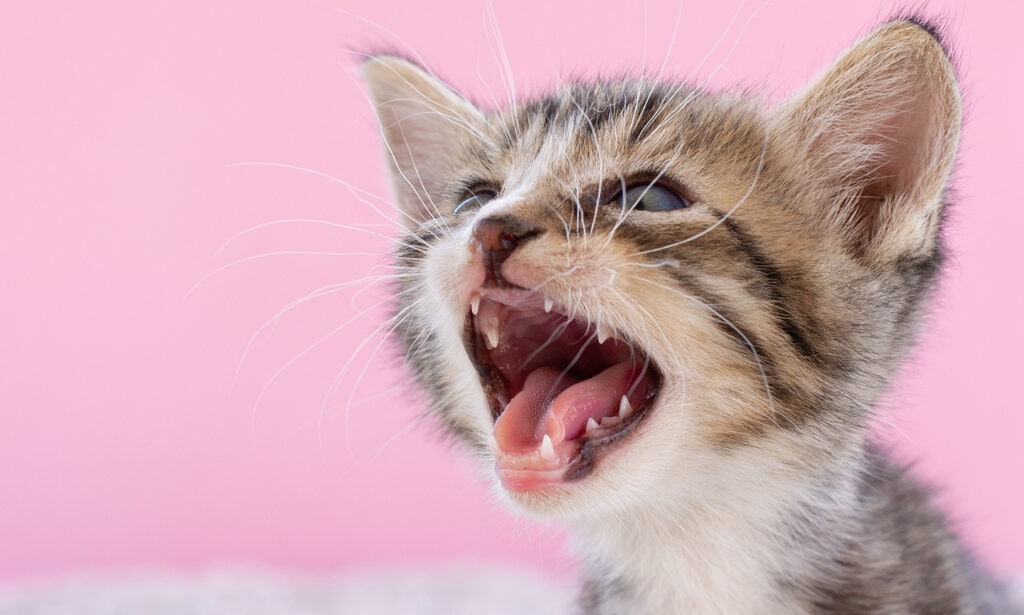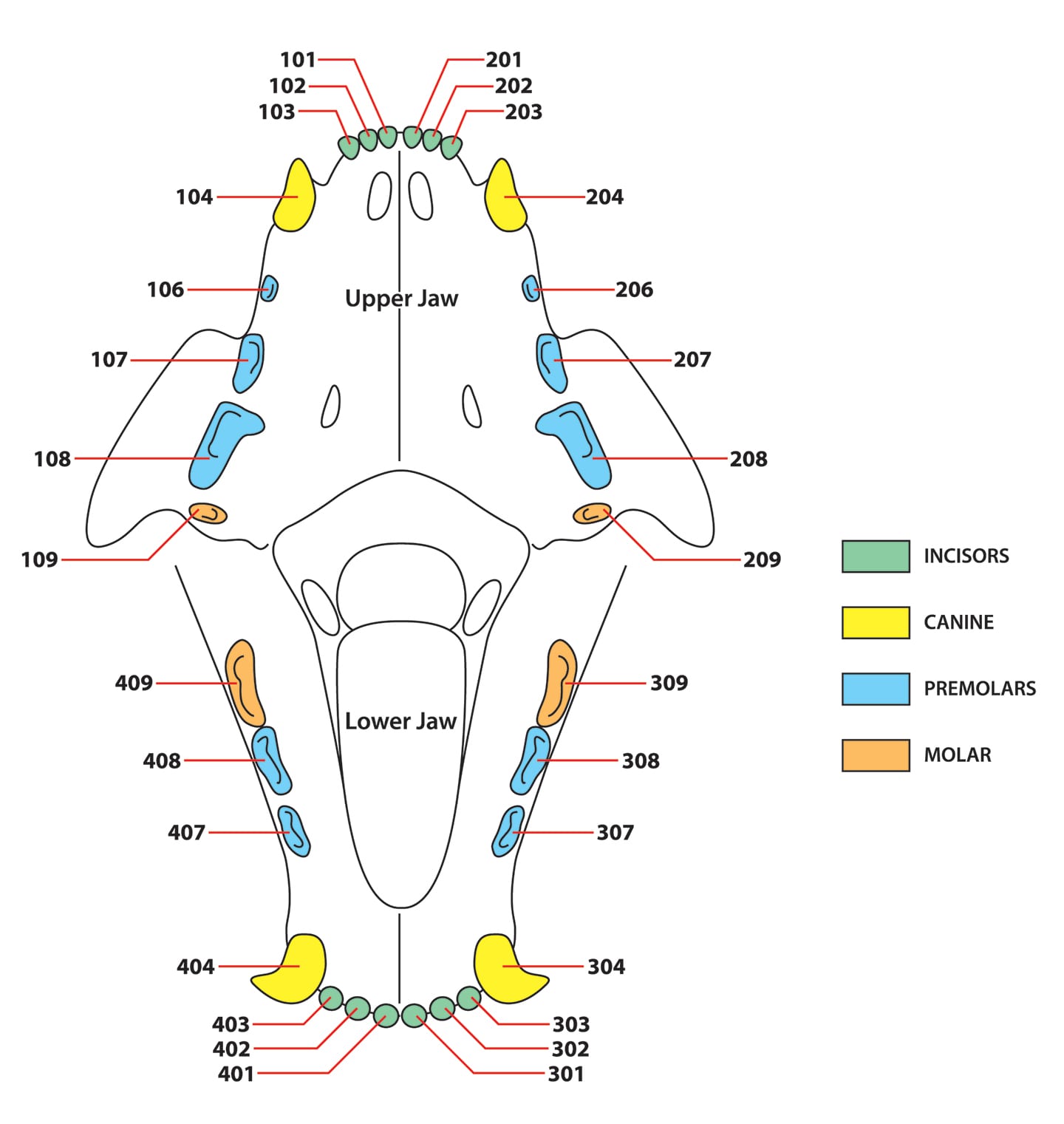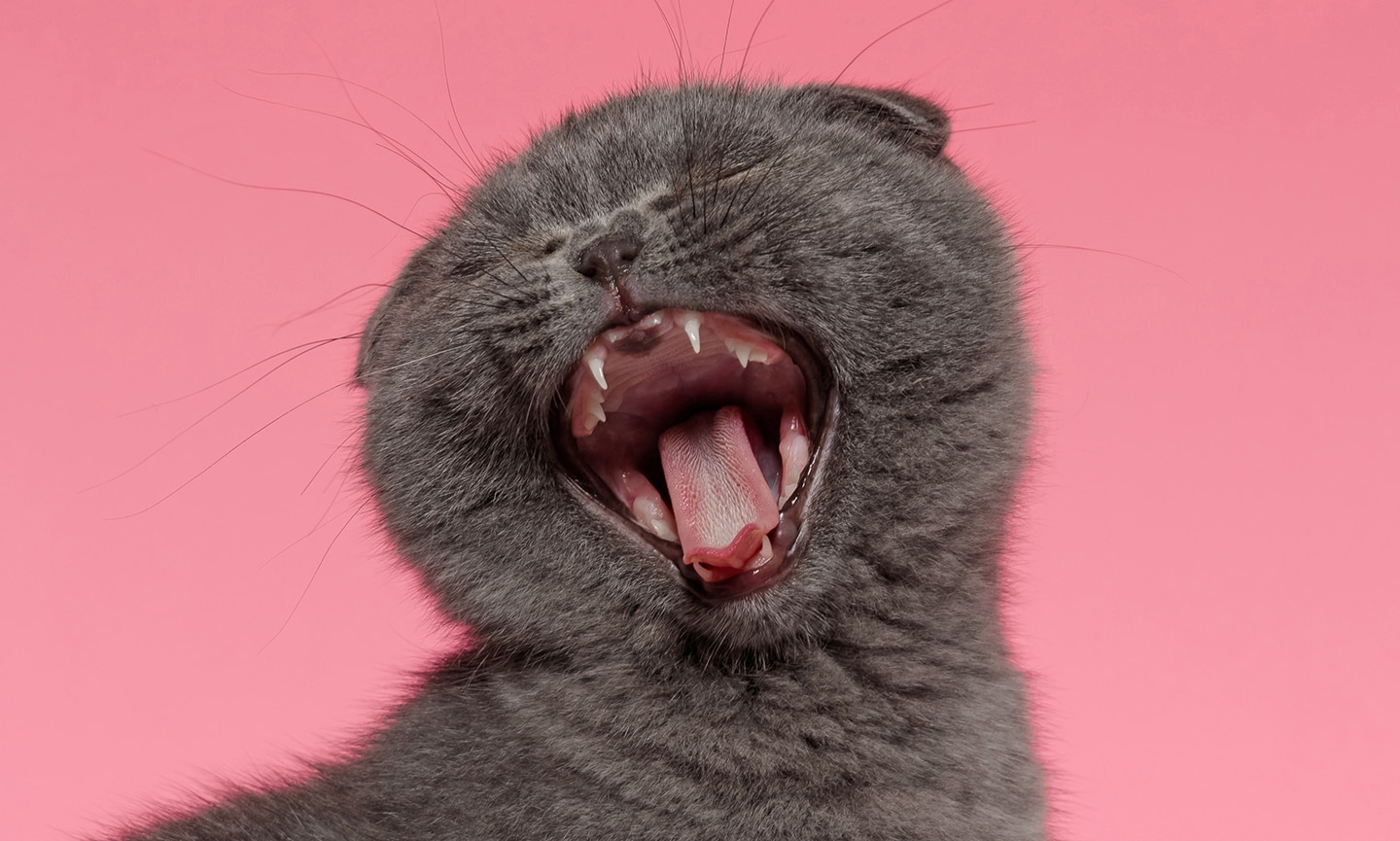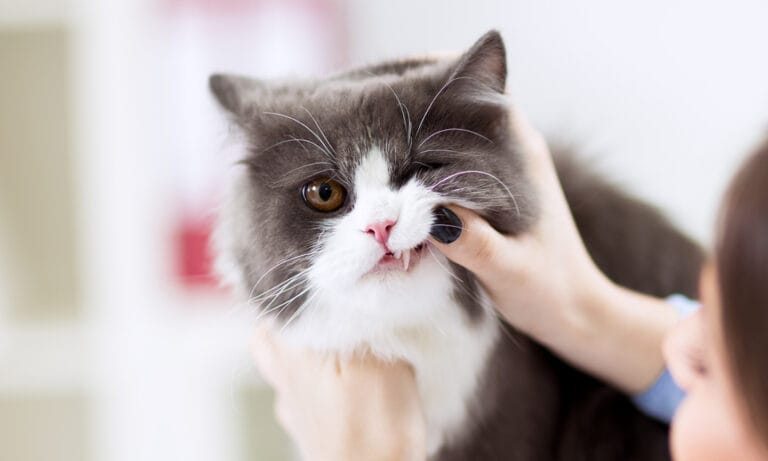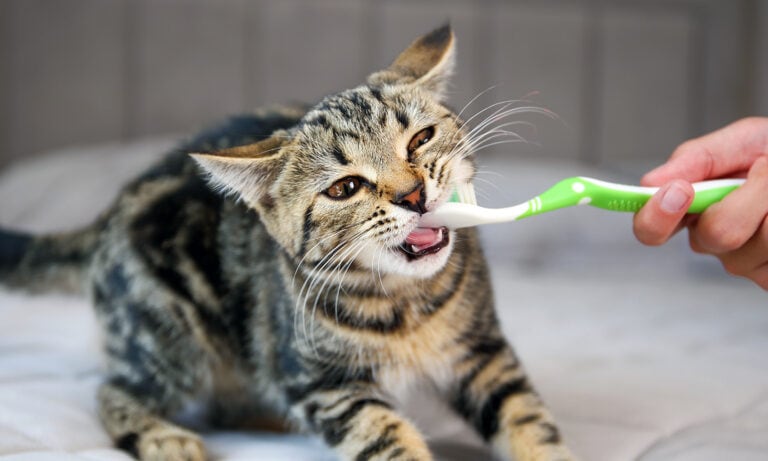Behind your cat’s cute whiskers and soft fur lies a mouthful of chompers. But how much do you know about your cat’s teeth? Ever wanted to learn how many teeth cats have? What about the difference between kitten teeth and adult teeth?
We spoke with vet experts to not only answer how many teeth cats have but also identify where your cat’s 30 adult teeth are located. Plus, we discuss the importance of dental cleanings for cats and more.
Click to jump to each section:
How Many Teeth Do Cats Have?
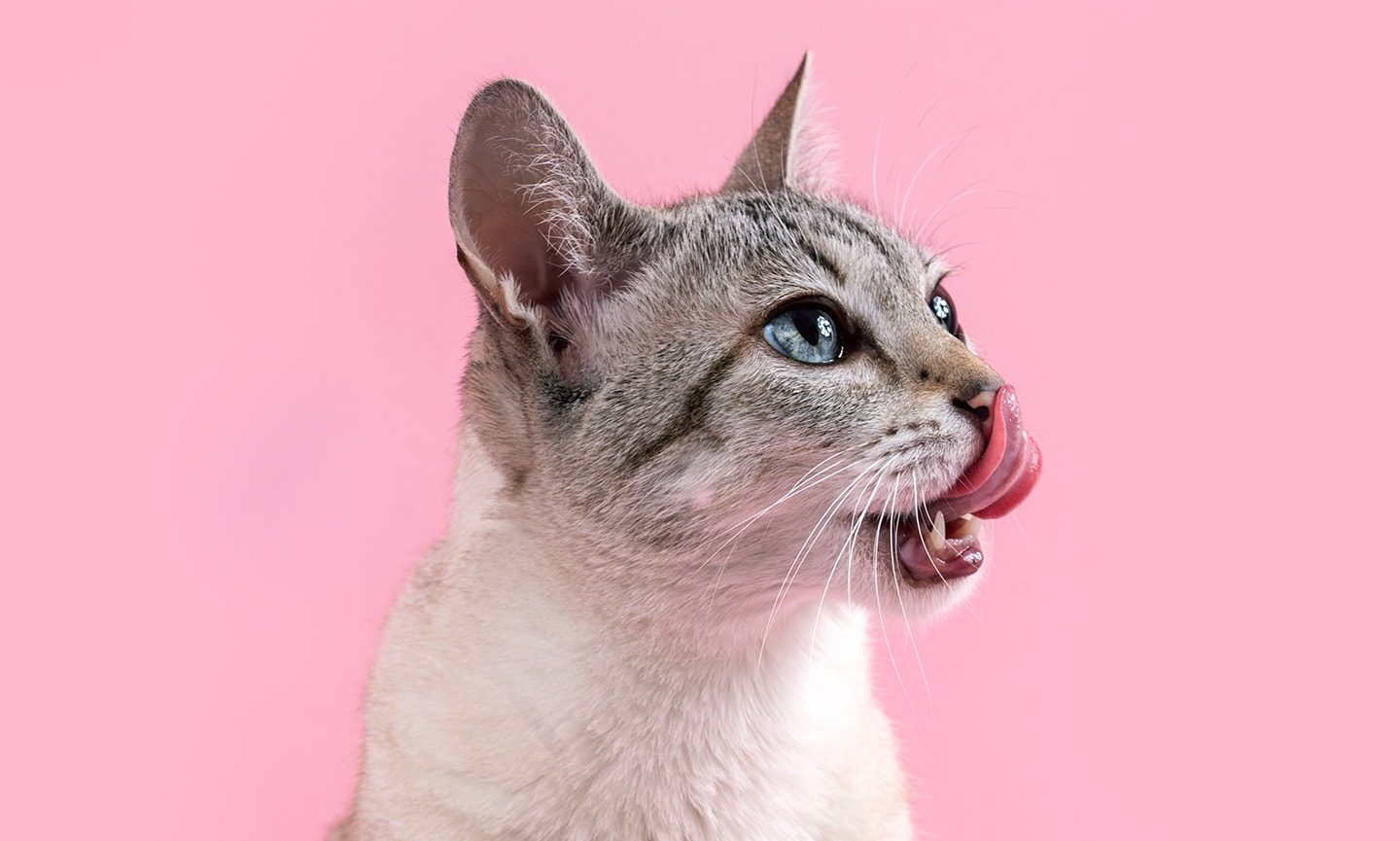
During their lives, cats will have two full sets of teeth:
- Kittens have 26 baby teeth.
- Adult cats have 30 permanent teeth.
Cat Teeth Diagram
To learn where your cat’s 30 adult teeth are located in their upper jaw and lower jaw, see the picture of cat teeth below.
Types of Cat Teeth
Cats have four types of permanent teeth:
- Incisors: These teeth are located at the front of your cat’s mouth. They erupt between 11 weeks of age and 4 months of age.
- Canines: These teeth are located toward the front of your cat’s mouth. They resemble fangs. They erupt between 3 and 5 months of age.
- Premolars: These teeth are located behind the canines and in front of the molars. They erupt between 4 and 5 months of age.
- Molars: These teeth are located in the very back of your cat’s mouth. They erupt between 5 and 6 months of age.
Incisors
6
6
Scraping and grooming
Canines
2
2
Scraping and gripping
Premolars
6
4
Grinding and chewing
Molars
2
2
Crushing and grinding
How Many Teeth Do Kittens Have?
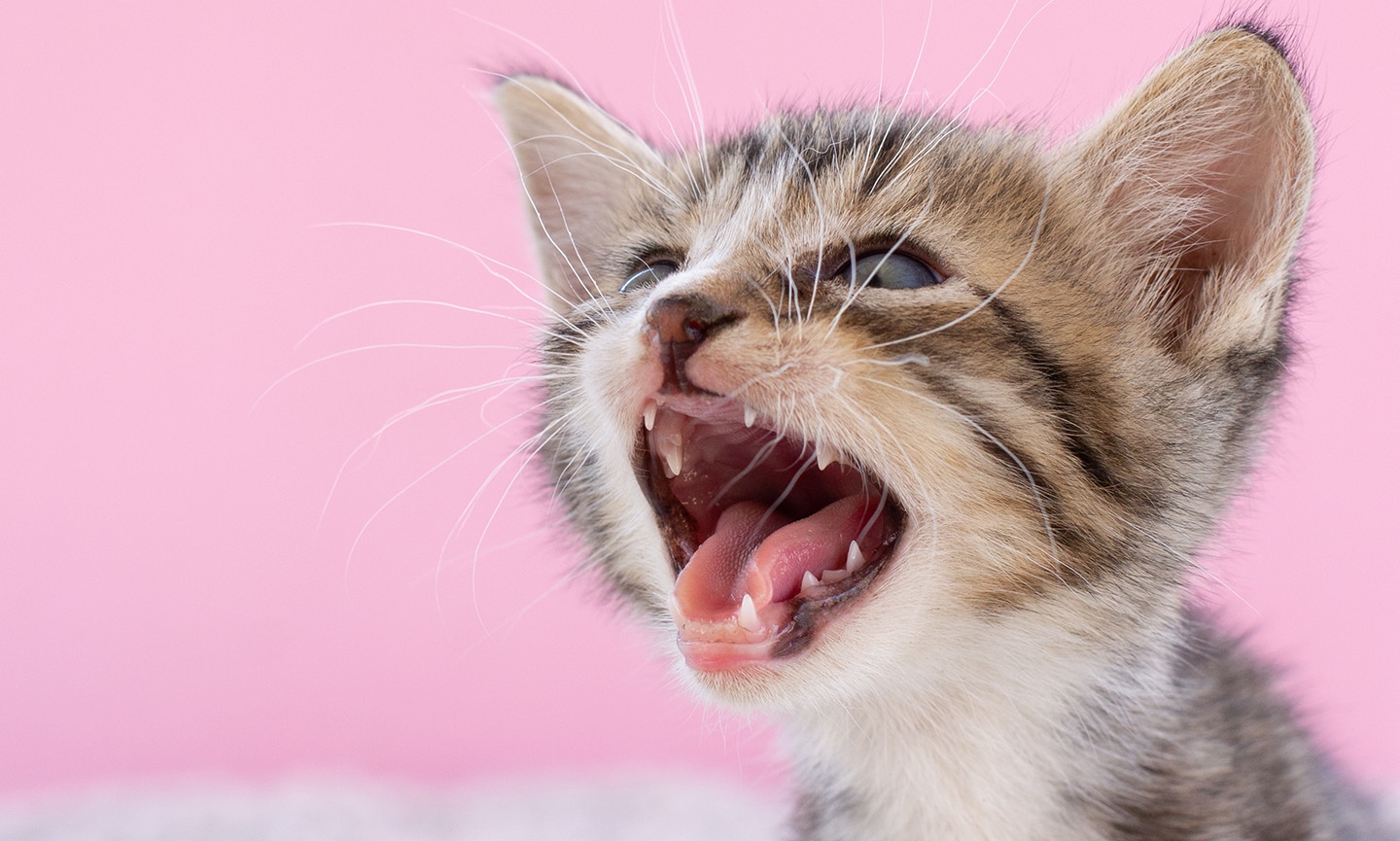
Kittens are born without any visible teeth, but by the time the kitten teething process has come to an end, kittens have a total of 26 baby teeth. This first set of teeth is called deciduous teeth.
Here’s where kitten teeth are located and the purpose they serve:
Canines
2
2
Gripping and tearing
Incisors
6
6
Biting and cutting
Premolars
6
4
Grinding and chewing
Are Kittens Born With Teeth?
Kittens are born with no visible teeth. Their baby teeth, also called milk teeth, are below the gumline.
At 2-3 weeks of age, the baby teeth begin erupting.
When Do Kittens Get Teeth?
A kitten’s baby teeth appear in the following order:
- Incisors: come in between 2 and 4 weeks of age
- Canine teeth: come in between 3 and 6 weeks of age
- Premolars: come in between 4 and 6 weeks of age
When Do Kittens Lose Teeth?
To make room for their adult teeth, kittens lose all their deciduous teeth. This process begins around 3.5 months of age; by about 6 months of age, kittens will have lost all their baby teeth.
Occasionally, kittens will have retained deciduous teeth, also called persistent teeth. These are baby teeth that fail to fall out on their own. Cat deciduous teeth are problematic for a couple of reasons:
- First, they can lead to crowding in the cat’s mouth, which in turn allows food to become trapped between their teeth. The trapped food can cause tartar buildup, tooth decay, gingivitis and periodontal disease.
- Second, they can create an abnormal bite, which can cause discomfort and pain. This can lead to difficulty chewing and eating.
For these reasons, deciduous teeth almost always need to be removed by a vet. If you notice your cat hasn’t lost a baby tooth when they should have, schedule an appointment with your vet ASAP, as your cat will likely need a tooth extraction.
Do Cats’ Teeth Fall Out?
Unfortunately, as is the case with human teeth, cats’ permanent teeth can fall out. It shouldn’t be happening on a regular basis, but cats’ teeth fall out for several reasons such as age, dental disease or trauma.
“Cats can develop cavities, gum disease and other oral health issues that can cause teeth to become loose and eventually fall out,” says Dr. Sara Ochoa, DVM, a veterinarian at Animal Hospital of West Monroe in West Monroe, Louisiana, and the co-founder of How To Pets.
Additionally, cats are prone to tooth resorption—formerly referred to as feline odontoclastic resorptive lesion (FORL) or cervical line lesion—a condition where the cat’s body begins to break down a tooth from the inside out. Dr. Ochoa says it can cause pain and as such, a cat with resorption often needs to have the tooth removed.
If your feline friend loses any of their adult teeth, call your vet to schedule an exam.
How to Keep Your Cat's Teeth Healthy
Many conditions can lead to tooth loss in cats. Here are some ways to keep your favorite carnivore’s teeth healthy and intact.
Brush Your Cat’s Teeth
Yes, we’re serious! “You can and should brush your cat's teeth regularly,” says Dr. Ochoa. “It might take some time for your cat to get used to the process, but with a little patience and persistence, it can become a part of your grooming routine.”
Begin with short teeth brushing sessions, and give your fur baby plenty of positive reinforcement. Also, be certain to choose a toothbrush and toothpaste made for cats.
Feed Your Cat a Healthy Diet
Your cat’s diet has an impact on your cat’s overall health, and this includes their dental health. Dr. Ochoa recommends you select high-quality, nutritious cat food to keep your cat’s teeth and gums in tip-top shape. Your vet can help you choose the best food for your cat.
Dr. Ochoa cautions pet parents against giving their cats sugary or processed human foods because those can cause harmful bacteria to grow in your cat’s mouth. You can, however, occasionally treat cats to safe human foods, like pumpkin or strawberries.
Give Your Cat Dental Treats and Dental Toys
Offer your cat dental treats that promote healthy teeth and gums.
“Look for products with the Veterinary Oral Health Council (VOHC) seal of approval,” Dr. Ochoa says, “as they have been proven effective at reducing plaque and tartar buildup.”
Greenies get rave reviews from cat parents and are VOHC approved. DentaLife is another VOHC (and pet parent!) approved option.
Don’t Give Your Cat Bones
Don’t offer bones to your cats, as they can cause dental problems.
“Bones can easily crack or splinter, which can cause damage to your cat’s teeth or get stuck in their gums,” says Dr. Ochoa.
Keep Your Cat Hydrated
Because water can help wash away bacteria and food particles, drinking plenty of water can help your cat avoid dental problems.
Here’s how to help your cat to drink more water.
Take Your Cat for Regular Dental Checkups
Schedule annual dental checkups with your vet, who can look in your cat’s mouth to look for signs of dental issues, says Dr. Ochoa.
Additionally, having your cat’s teeth professionally cleaned at least once a year will help keep their teeth healthy. Even if you brush your cat’s teeth every day, don’t skip those annual dental cleanings. An important part of your cat’s dental health involves cleaning below the gumline, and only a veterinary dentist can do that.
Look for Signs of Dental Problems
Pay attention to your cat’s mouth and their behavior. If anything seems amiss, call the vet. Dr. Ochoa says the following are some signs of dental problems in cats:
- Bad breath: “While cats may not have the freshest breath to begin with, severe or sudden bad breath can be a sign of dental problems,” Dr. Ochoa says.
- Difficulty eating/decreased appetite: Cats who are having a hard time chewing, are dropping their food or are avoiding hard kibble altogether may be experiencing dental problems.
- Pawing at the mouth: When cats feel pain or irritation from dental issues, they may paw at their mouths.
- Swollen or bleeding gums: “Red, swollen or bleeding gums can be a sign of gingivitis or gum disease, which can lead to bigger dental problems,” Ochoa says.
- Weakness or lethargy: Cats can become lethargic or demonstrate signs of weakness when in pain.
- Excessive drooling: “If you notice your cat drooling, it could be a sign of dental problems,” Dr. Ochoa says.
“If you notice any of these signs in your cat, it’s important to have them checked out by a veterinarian as soon as possible,” says Dr. Ochoa. “Remember, catching dental problems early can save your cat a lot of discomfort and prevent bigger health issues down the line.”
Q:
Do cats' teeth fall out?
Q:
What are the differences between kitten teeth vs. cat teeth?
A:There are a few differences between kitten teeth and cat teeth, including:
- Number: Kittens have 26 deciduous teeth, while adult cats have 20 permanent teeth.
- Strength: Kitten teeth are not as strong as adult cat teeth, says Dr. Sabrina Kong, DVM, a vet at a small animal clinic in Northern California and a veterinary consultant for We Love Doodles. Adult teeth must last a lifetime, while kittens have their baby teeth for less than five months.
- Susceptibility to tooth decay: This lack of strength makes kitten teeth more susceptible to tooth decay if they consume too much milk because the sugar content is higher, says Dr. Ochoa. This can encourage bacteria growth. However, adult cat teeth are “still susceptible to decay without proper oral hygiene,” she says.
- Size and shape: “Kittens' teeth are smaller, sharper and more pointed than adult cats' teeth,” says Dr. Ochoa. “Adult cats' teeth are broader and flatter to help them break down food better.”
Q:
When do cats get adult teeth?
More on caring for your cat's teeth:
Share:
